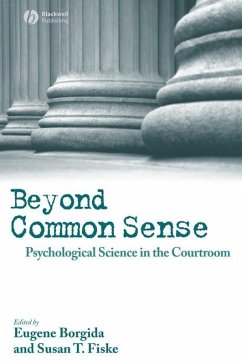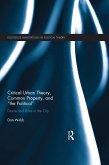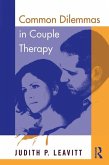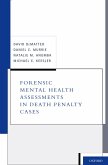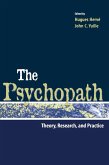Beyond Common Sense addresses the many important and controversial issues that arise from the use of psychological and social science in the courtroom. Each chapter identifies areas of scientific agreement and disagreement, and discusses how psychological science advances our understanding of human behavior beyond common sense.
- Features original chapters written by some of the leading experts in the field of psychology and law including Elizabeth Loftus, Saul Kassin, Faye Crosby, Alice Eagly, Gary Wells, Louise Fitzgerald, Craig Anderson, and Phoebe Ellsworth
- The 14 issues addressed include eyewitness identification, gender stereotypes, repressed memories, Affirmative Action and the death penalty
- Commentaries written by leading social science and law scholars discuss key legal and scientific themes that emerge from the science chapters and illustrate how psychological science is or can be used in the courts
Dieser Download kann aus rechtlichen Gründen nur mit Rechnungsadresse in D ausgeliefert werden.
"This collection is a gem! It unmasks the fallacies on race andgender that pass for 'common sense' so skillfully thatit is hard to read without shouting 'Aha!'"
--Nancy Cantor, Chancellor and President, SyracuseUniversity
"This is a timely and extremely interesting analysis of the manyways in which psychological science can contribute to a moreaccurate understanding of various psychological issues often raisedin legal proceedings. This book will be useful, and a very goodread, for the general public as well as the psychological and legalcommunities."
--Sharon S. Brehm, Indiana University Bloomington, Presidentof the American Psychological Association (2007)
"This book is an indispensable guide--for scholars andpractitioners alike--to the psychological science of the legalsystem. Its pages are filled with important, hard-won lessons thatwe can turn to our advantage or ignore at our peril."
--Daniel Gilbert, Harvard University
"The legal system is also a system of perception, emotion,interpersonal relations, and judgment. It is thus crucial thatlawyers, social scientists and indeed the broader public understandits psychological dimensions. This volume assembles key examples ofthe recent strides psychologists have made in understandingcourtroom processes and the psychosocial dimensions that shape howlaw works in a variety of settings from workplaces to the media. Itwill be a vital resource for both professionals andstudents."
--Craig Calhoun, President, Social Science ResearchCouncil
"Incrementally, chapter by chapter, this world-class collectionof scholars and researchers upends our common sense understandingsof human prejudice and the law's ability to control it. Yet, justas importantly, it brings to the fore a vastly deeper understandingof these issues. It is more than a state of the art collection. Itis a classic collection that, for a long time, will beindispensable to discussions of prejudice and the law, as well asthe relationship between science and the public good."
--Claude M. Steele, Stanford University
--Nancy Cantor, Chancellor and President, SyracuseUniversity
"This is a timely and extremely interesting analysis of the manyways in which psychological science can contribute to a moreaccurate understanding of various psychological issues often raisedin legal proceedings. This book will be useful, and a very goodread, for the general public as well as the psychological and legalcommunities."
--Sharon S. Brehm, Indiana University Bloomington, Presidentof the American Psychological Association (2007)
"This book is an indispensable guide--for scholars andpractitioners alike--to the psychological science of the legalsystem. Its pages are filled with important, hard-won lessons thatwe can turn to our advantage or ignore at our peril."
--Daniel Gilbert, Harvard University
"The legal system is also a system of perception, emotion,interpersonal relations, and judgment. It is thus crucial thatlawyers, social scientists and indeed the broader public understandits psychological dimensions. This volume assembles key examples ofthe recent strides psychologists have made in understandingcourtroom processes and the psychosocial dimensions that shape howlaw works in a variety of settings from workplaces to the media. Itwill be a vital resource for both professionals andstudents."
--Craig Calhoun, President, Social Science ResearchCouncil
"Incrementally, chapter by chapter, this world-class collectionof scholars and researchers upends our common sense understandingsof human prejudice and the law's ability to control it. Yet, justas importantly, it brings to the fore a vastly deeper understandingof these issues. It is more than a state of the art collection. Itis a classic collection that, for a long time, will beindispensable to discussions of prejudice and the law, as well asthe relationship between science and the public good."
--Claude M. Steele, Stanford University

